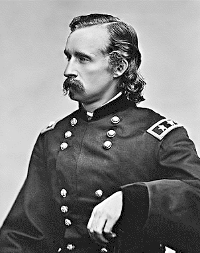On This Date In History
The Strange Case Of The Battle Of The Little Bighorn
August 5, 2024
The story of the Battle of the Little Bighorn is often told these days with General Custer bearing all of the responsibility for the outcome of the battle. Indeed, this has become so widespread that responsibility for the battle is no longer really a matter that is explored. Presentations about Custer and the battle now tend to revolve around what motivated him leading up to that event.
Interestingly, a more modern military figure has written about the topic of responsibility for failure on the battlefield. That figure is General Omar Bradley.
General Omar Bradley was an American military commander during World War II. He would help lead the Allies to victory and go on to become one of the few persons to hold a five-star rank in the American military.
Following WW2, Bradley would write a book in which he would relate experiences of his during the war. At one point, he would write about the notion of putting all of the responsibility for a military failure on one person. He would pose the question: "how can the failure be laid fairly on a single man when there are in reality so many factors that can affect the outcome of of any battle?" (Bradley, 65). This question has implications for the Battle of the Little Bighorn.
In light of Bradley's question, the Battle of the Little Bighorn becomes a rather strange case. Bradley questions how a single man can be made to bear all of the responsibility for a battle's outcome - and yet, that is so often what happens when the story of the Battle of the Little Bighorn is told. This indicates that the commonly told story of the Battle of the Little Bighorn might not be quite accurate.
Bradley's question is valuable when examining the Battle of the Little Bighorn because it comes from a military expert. At first glance, the idea that Custer is solely responsible for the battle's outcome may make sense to some - after all, he was leading the 7th Cavalry when it headed into the valley of the Little Bighorn on June 25th, 1876. However, Bradley's insight helps to put things into perspective.
Although the Battle of the Little Bighorn is often told these days in a way that places all of the responsibility for the defeat on the shoulders of General Custer, when considered in the light of General Bradley's view on responsibility and military failure, such presentations no longer seem to hold up. Perhaps there is more to the Battle of the Little Bighorn than has sometimes been presented.
About the Author
Tim Kloos is an online advertising professional. He helps clients with their websites, online presence, and online advertising. If you need help with any of these, feel free to contact him via the contact page.
His tech website is clevelandwebdesignplus.com.
He has also written a children's book set in the Old West.
